Book contents
- Frontmatter
- Contents
- List of illustrations
- List of tables
- Preface
- Acknowledgements
- List of abbreviations
- 1 The uneasy special relationship: dynamics and divergencies
- 2 Breakdown: into war, 1895–1899
- 3 Post-war: the myth of magnanimity, 1905–1907
- 4 African interests and the South Africa Act, 1908–1910
- 5 ‘Greater South Africa’: the struggle for the High Commission Territories, 1910–1961
- 6 The economic dimension: South Africa and the sterling area, 1931–1961
- 7 Britain, the United Nations, and the ‘South African disputes’, 1946–1961
- 8 The political consequences of Seretse Khama and Ruth, 1948–1952
- 9 Containing Afrikanerdom: the geopolitical origins of the Central African Federation, 1948–1953
- 10 Strategy and the transfer of Simon's Town, 1948–1957
- 11 The parting of the ways: the departure of South Africa from the Commonwealth, 1951–1961
- 12 Enfeebled lion? How South Africans viewed Britain, 1945–1961
- 13 Springbok reviled: some British reactions to apartheid, 1948–1994
- Epilogue The relationship restored: the return of the new South Africa to the Commonwealth, 1994
- Select bibliography
- Index
7 - Britain, the United Nations, and the ‘South African disputes’, 1946–1961
Published online by Cambridge University Press: 03 December 2009
- Frontmatter
- Contents
- List of illustrations
- List of tables
- Preface
- Acknowledgements
- List of abbreviations
- 1 The uneasy special relationship: dynamics and divergencies
- 2 Breakdown: into war, 1895–1899
- 3 Post-war: the myth of magnanimity, 1905–1907
- 4 African interests and the South Africa Act, 1908–1910
- 5 ‘Greater South Africa’: the struggle for the High Commission Territories, 1910–1961
- 6 The economic dimension: South Africa and the sterling area, 1931–1961
- 7 Britain, the United Nations, and the ‘South African disputes’, 1946–1961
- 8 The political consequences of Seretse Khama and Ruth, 1948–1952
- 9 Containing Afrikanerdom: the geopolitical origins of the Central African Federation, 1948–1953
- 10 Strategy and the transfer of Simon's Town, 1948–1957
- 11 The parting of the ways: the departure of South Africa from the Commonwealth, 1951–1961
- 12 Enfeebled lion? How South Africans viewed Britain, 1945–1961
- 13 Springbok reviled: some British reactions to apartheid, 1948–1994
- Epilogue The relationship restored: the return of the new South Africa to the Commonwealth, 1994
- Select bibliography
- Index
Summary
The British alignment with South Africa at the United Nations in the years 1946 to 1960 seems simple enough to explain. A British government preoccupied with protecting its economic and strategic interests in South Africa (or even just its economic interests there) supported South Africa in this international forum until the domestic and international reaction against apartheid forced a limited change of British policy; and though in 1961 the British government joined the majority of nations represented in the General Assembly in admonishing South Africa, it continued to resist Assembly initiatives which threatened those same economic and strategic interests for many years to come. This is a familiar explanation of Anglo-South African relations at the United Nations (UN), though a far from accurate one.
For the first fifteen years after the Second World War, the British government was indeed South Africa's leading ally on the issues that most directly concerned South Africa at the UN: the future of South-West Africa (Namibia), the treatment of ‘Indians’ in South Africa and the ‘race conflict’ there. The British government backed the Smuts government's initial attempt to incorporate South-West Africa within the Union of South Africa and supported the South African contention that the UN could intervene in the administration of South-West Africa only with the agreement of the South African government itself.
- Type
- Chapter
- Information
- The Lion and the SpringbokBritain and South Africa since the Boer War, pp. 146 - 167Publisher: Cambridge University PressPrint publication year: 2003
- 1
- Cited by



